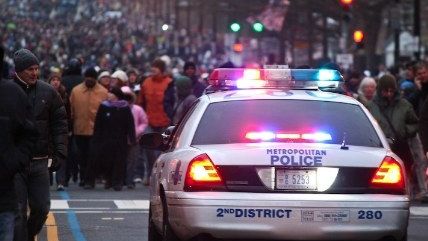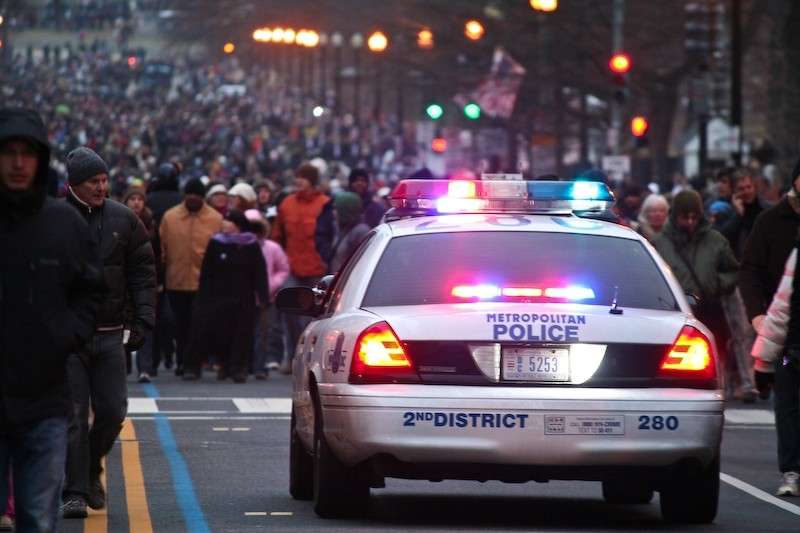Is Rising Violence a 'Ferguson Effect'?
Is increase in violent crime an actual trend or just a fluctuation?


Chicago, never an island of tranquility, has been roiled by a surge in serious violence. Last year, the number of murders rose by nearly 13 percent over 2014, and shootings increased by a similar amount. Figures for January indicate a continuation of that unhealthy trend.
What is happening here is also happening elsewhere. Last year, Cleveland suffered a 90 percent jump in homicides; in Nashville, the increase was 83 percent. In the 50 biggest U.S. cities, The Washington Post reports, homicides were up by 17 percent last year—"the worst annual change since 1990."
Over the past quarter century, America has gotten much safer. In 1991, the murder rate was more than double what it was in 2014. Chicago, which had 943 murders in 1992, was down to 484 last year. But the recent shift raises the specter of violent crime making a comeback.
How could that happen? In October, FBI director James Comey said there is "a chill wind blowing through American law enforcement," which could make "officers reluctant to get out of their cars and do the work that controls violent crime."
The theory is called the Ferguson effect: As police face greater scrutiny, in the aftermath of the fatal shooting of Michael Brown in 2014, they are more hesitant in doing their jobs. "Officers are backing off proactive policing, and criminals are emboldened," wrote analyst Heather Mac Donald of the conservative Manhattan Institute in the Los Angeles Times.
It's hardly implausible to think that given the intense spotlight that has shown on cops who have killed unarmed black men, some officers would shy away from some confrontations. It's not far-fetched to figure that in that case, bad guys would take advantage of the leeway.
But a one-year increase is not a trend: The national murder rate rose in 2005 and 2006, only to head back down afterward. In Chicago, homicides spiked upward in 2008, before falling in each of the next three years. Last year's total was lower than the number in 2008.
Northeastern University criminologist James Alan Fox has looked at the murder rate in individual cities over time and made a discovery. "I found 2-1 odds that if it goes up by 20 percent or more one year, it will go down the following year," he told me. Random fluctuations are inevitable. In a period of relatively low crime rates, there is probably also an irreducible minimum—which means that everything else being equal, they are more likely to rise than to fall.
But it would be imprudent to ignore what happened in 2015. The numbers cited by those who see a Ferguson effect are not conclusive and could turn around this year. Still, as Mac Donald told me, "a 17 percent change in a year up or down is huge." A one-year increase is not a lasting upward trend—but any lasting upward trend begins with a one-year increase.
"It is not possible to speak to police officers, in my experience, without hearing of their concerns about the current political climate regarding policing and the hostility they are encountering on the street," she attests. But diagnosing the causes of an increase in violent crime is not the same thing as devising a cure. The Ferguson effect, if it is real, is the result of factors that are not terribly amenable to control.
One reason police may be more nervous is the ubiquity of video devices that document their actions—which are sometimes horrifying. In the old days, the Chicago cop who pumped 16 bullets into Laquan McDonald would have gotten away with it because his lies would have gone undetected. What makes some cops wary is the fear of being caught doing things they are not allowed to do.
The video revelations have had another effect: deepening mistrust of the police among African-Americans. Many black teens in Chicago fear cops as well as criminals. The greater their fright, the less cooperation and the more resistance law enforcement will face in black neighborhoods.
Neither of these factors can be banished by a change in policy or political rhetoric. The only hope is that police will learn to operate with appropriate aggressiveness, without committing abuses—and that when they do, they will earn the confidence of law-abiding citizens, making their jobs easier.
That change is something to be desired if it turns out there is, in fact, a lasting Ferguson effect. Or if there isn't.
© Copyright 2016 by Creators Syndicate Inc.


Show Comments (90)